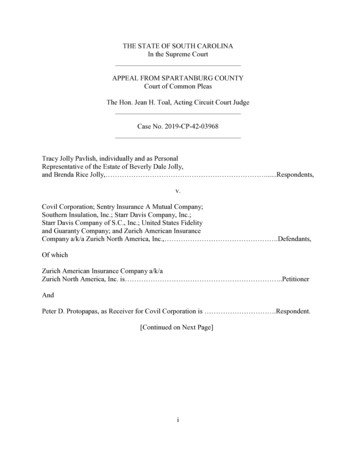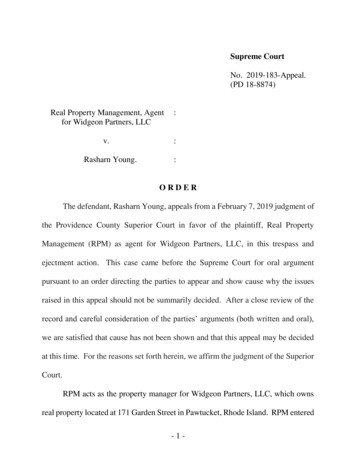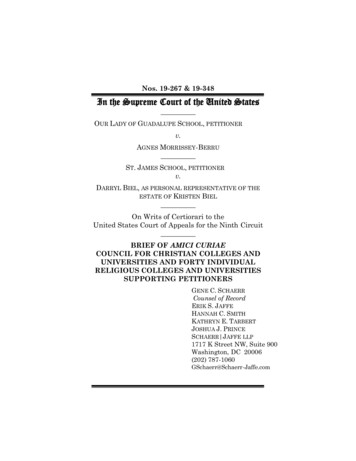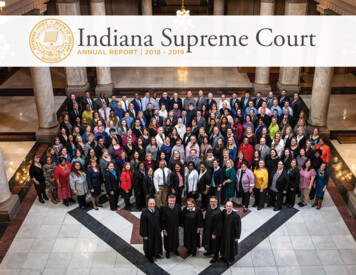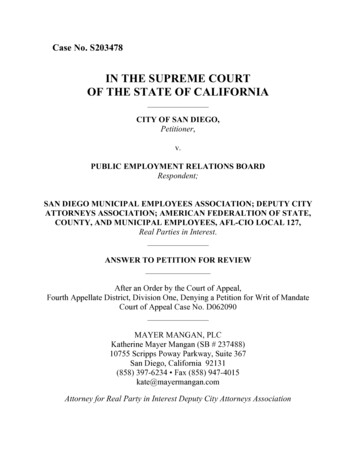
Transcription
Case No. S203478IN THE SUPREME COURTOF THE STATE OF CALIFORNIACITY OF SAN DIEGO,Petitioner,v.PUBLIC EMPLOYMENT RELATIONS BOARDRespondent;SAN DIEGO MUNICIPAL EMPLOYEES ASSOCIATION; DEPUTY CITYATTORNEYS ASSOCIATION; AMERICAN FEDERALTION OF STATE,COUNTY, AND MUNICIPAL EMPLOYEES, AFL-CIO LOCAL 127,Real Parties in Interest.ANSWER TO PETITION FOR REVIEWAfter an Order by the Court of Appeal,Fourth Appellate District, Division One, Denying a Petition for Writ of MandateCourt of Appeal Case No. D062090MAYER MANGAN, PLCKatherine Mayer Mangan (SB # 237488)10755 Scripps Poway Parkway, Suite 367San Diego, California 92131(858) 397-6234 Fax (858) 947-4015kate@mayermangan.comAttorney for Real Party in Interest Deputy City Attorneys Association
TABLE OF CONTENTSI. INTRODUCTION . 1II. RELEVANT FACTUAL AND PROCEDURAL BACKGROUND . 3A. Related Cases For Which Review is Not Sought . 3B. The Petition Seeks Review of a Summary Denial of the City’s Writ Petition,Which Invoked the Court of Appeal’s Original Jurisdiction . 8III. REVIEW SHOULD BE DENIED BECAUSE THE APPELLATE ORDER DOESNOT IMPLICATE AN IMPORTANT QUESTION OF LAW . 9A. The Court of Appeal Declined to Issue a Decision Without a Factual Record . 111. The Court of Appeal Declined to Issue a Decision That Would Not Resolve theDispute . 112. The Court of Appeal Could Not Do What Would Be Necessary to Issue aDecision That Would Resolve the Dispute . 12B. By Declining to Rule, the Court of Appeal Simply Required the Dispute to Followthe Statutorily Prescribed (and Typical) Procedure of an Administrative HearingBefore Appellate Review. 171. PERB Has Exclusive Initial Jurisdiction to Adjudicate UnfairPractice Charges. 172. Exhaustion of Administrative Remedies is Appropriate, As It AlmostAlways Is . 22C. The Request for a Stay Should be Denied . 26IV. CONCLUSION . 26i
TABLE OF AUTHORITIESCasesAbelleira v. District Court of Appeal (1941) 17 Cal.2d 289 . 23Amaral v. Cintas Corp. No. 2 (2008) 163 Cal.App.4th 1157. 11Bernard v. Hartford Fire Ins. Co. (1991) 226 Cal.App.3d 1203 . 10Bernardi v. City Council (1997) 54 Cal.App.4th 426 . 19Busick v. Workmen’s Comp. Appeals Bd. (1972) 7 Cal.3d 967 . 19Coachella Valley Mosquito and Vector Control Dist. v. CaliforniaPublic Employment Relations Board (2005) 35 Cal.4th 1072 . 18, 24County of Contra Costa v. State of California (1986) 177 Cal.App.3d 62 . 18Crumpler v. Board of Administration (1973) 32 Cal.App.3d 567 . 21Cumero v. Public Relations Bd. (1989) 49 Cal.3d 575 . 18, 25Hogya v. Superior Court (1977) 75 Cal.App.3d 122 . 15Hooser v. Super. Ct. (2000) 84 Cal.App.4th 997 . 20In Re Electric Refund Cases (2010) 184 Cal.App.4th 1490. 25In re Zeth S. (2003) 31 Cal.4th 396 . 13International Union of Operating Engineers v. State Personnel Board(2002) PERB Dec. No. 1491-S . 18, 19Jiminez v. Super. Ct. (2002) 29 Cal.4th 473 . 20Morgan v. United States (1938) 304 U.S. 1 . 21Pacific Legal Foundation, supra, 29 Cal.3d . 20People v. Peevy (1998) 17 Cal.4th 1184 . 13PERB v. Modesto City School Dist. (1982) 136 Cal.App.3d 881 . 6, 23PERB v. Superior Court (1993) 13 Cal.App.4th 1816 . 18, 25Perry v. Brown (2011) 52 Cal.4th 1116 . 22Petrillo v. Bay Area Rapid Transit Dist. (1988) 197 Cal.App.3d 798 . 21Philippine Export & Foreign Loan Guarantee Corp. v. Chuidian(1990) 218 Cal.App.3d 1058 . 13, 14ii
Rose v. City of Hayward (1981) 126 Cal.App.3d 926. 21San Diego Municipal Employees Ass’n v. Superior Court,Court of Appeal Case No. D061724, 2012 WL 2308142 . 7, 18, 24San Ysidro School District (1980) PERB Dec. No. 134 . 19Scott v. Industrial Accident Commission (1956) 467 Cal.2d 76 . 19Selby Realty Co. v. City of San Buenaventura (1973) 10 Cal.3d 110 . 11Service Employees International Union, Local 817 v. County ofMonterey (2004) PERB Dec. No. 1663-M . 22Tupman v. Haberken (1929) 208 Cal. 256 . 13Vernon v. State of California (2004) 116 Cal.App.4th 114 . 11Yamaha Motor Corp. v. Superior Court (1986) 185 Cal.App.3d 1232 . 23StatutesCode Civ. Proc., § 909 . 13Gov. Code, § 3509. 17, 19, 23Gov. Code, § 3509.5. 22Gov. Code, § 3541.3. 6, 23Gov. Code, § 6252. 20RulesCal. Rules of Court, rule 8.204. 10Cal. Rules of Court, rule 8.500. 9, 20Cal. Rules of Court, rule 8.504(a) . 10RegulationsPERB regulations, section 32560 . 6iii
I.INTRODUCTIONThe Petition for Review asks this Court to remand the case so the Court ofAppeal can settle an important question of law. The problem is that the Court ofAppeal cannot settle anything at this early stage of the dispute. No fact-finder hasheard evidence or made any findings of fact, and critical factual disputes remain.The Court of Appeal’s refusal to decide a case in a vacuum, without a record, or tomake factual assumptions about the case, does not warrant this Court’sintervention. The Court of Appeal simply and appropriately declined to intervenewhen there is no factual record, instead requiring the dispute to work its waythrough the normal process of fact-finding and, thereafter, appellate review.The central controversy implicated by this case is the claim by the unionsfor the employees of the City of San Diego (collectively, “Unions”) that the Cityviolated its obligation to meet and confer with the Unions over the ComprehensivePension Reform Initiative (“Initiative”). The Initiative, among other things,changes the employee retirement system, freezes salaries, and dictates the openingbargaining position of the City. The City claims that it was not required to meetand confer because the Initiative is a citizen’s initiative, not a City action. TheUnions disagree and contend that the Initiative was a sham designed to circumventthe meet and confer requirement. Because it was truly a City-sponsored initiative,1
the Unions contend the meet and confer requirements apply. No fact-finder hasyet heard these arguments or taken any evidence.The Petition for Review arises from the summary denial of the City of SanDiego’s writ petition, which invoked the Court of Appeal’s original jurisdiction.The City asked the Court of Appeal to decide whether a citizen’s initiative issubject to the Meyers Milias Brown Act (“MMBA”), the law that governscollective bargaining between public entities and their employees. This isapparently the same question the Petition for Review asks this Court to remand tothe Court of Appeal. But the Court of Appeal could not resolve the controversyeven by deciding that question. A central dispute here is whether the Initiative is agenuine citizen’s initiative. Thus, even if the Court of Appeal had ruled as theCity requested—that citizen’s initiatives are not subject to the MMBA—thisdispute would continue. A trier of fact still would need to determine how the newrule applied in this case: that is, whether this Initiative is a citizen’s initiative notsubject to the MMBA.The Court of Appeal had only two other options, both of which itappropriately declined to exercise. The first was to find, as a factual matter (or amatter of mixed fact and law), that this Initiative was legitimate. Of course,appellate courts are not fact-finders, so the Court of Appeal’s refusal to make thatfinding was proper. Alternatively, the Court could have held that it is legallyimpossible for a citizen’s initiative ever to be a sham, meaning that this Initiativenecessarily is a “citizen’s initiative.” But that would have ignored the Unions’2
factual allegations and would effectively gut the MMBA. Under such a rule,public employers easily could circumvent the MMBA’s meet and conferrequirements. Employers would simply develop a document that formallycomplied with the “citizen’s initiative” rules, even if the employer wrote themeasure and used official resources to get it passed. The Court of Appealappropriately declined to make the sweeping assumption that all initiatives areautomatically legitimate.Absent a factual record, an appellate court is faced with Hobson’s choice ofissuing a decision that will not resolve the case, making factual findings, ormaking factual assumptions that will gut the MMBA. The Court of Appeal’sdecision not to intervene without a record does not warrant Supreme Court review.This Court should deny review and permit the dispute to proceed through thestatutorily prescribed administrative proceedings and normal appellate review.II. RELEVANT FACTUAL AND PROCEDURALBACKGROUNDA.Related Cases For Which Review is Not SoughtThe Initiative seeks to amend the City of San Diego’s charter by, amongother things, changing retirement benefits for certain current and future Cityemployees. (2 City Exhibit to Petition for Writ of Mandate [“CE” 276-283.)1 Italso defines the terms the City must use when it begins labor negotiations. (2 CE1References to the exhibits filed in support of the City’s Petition for Writ ofMandate as follows: volume number CE page number.3
277-278.) The Initiative was placed on the June 2012, ballot and passed by thevoters.The sponsorship and authorship of the Initiative is a hotly contested factual(or mixed legal and factual) issue. The Unions argue that the initiative is not agenuine citizen’s initiative, but is rather a City sponsored initiative. (See, e.g., 1CE 4, 7-9 [MEA arguing that City officials, acting in their official capacity,created and sponsored the Initiative]; 2 CE 237-240 [DCAA outlining evidenceand argument that the Mayor in his official capacity sponsored the Initiative].)They argue that the Initiative “is merely a sham device which City’s ‘StrongMayor’ has used for the express purpose of avoiding the City’s MMBAobligations to meet and confer.” (1 CE 4.) The Unions have gathered hundredsof pages of evidence, none of which has been heard by a fact-finder, to supporttheir position that the Initiative is not a legitimate citizen’s initiative. (1 CE 18234 [evidence supporting MEA’s Unfair Practice Charge]; 2 CE 237 [DCAAUnfair Practice Charge incorporating by reference the evidence gathered byMEA].)Catherine Boling, T.J. Zane, and Stephen B. Williams (collectively“Citizens”) and the City contend the Initiative was a legitimate citizen’s initiative.(See, e.g., City’s Writ Pet. at 14-18; Exhibits to MEA Petition for Writ of Mandate4
[“MEA Ex.”] 11, 115;2 Pet. for Review at p. 11-12.) The City has argued thatthere is “no evidence” to support the Unions’ charge that because no “officialaction” has been taken by the City of San Diego Council acting “as a body.”(MEA Ex. 10, 102-106, 11, 107 [City’s response to MEA’s unfair practice chargeand injunctive relief request].) The City has denied the following factualallegations:“3. From approximately April 2011 to date, Respondent,through its agents include chief labor negotiator San DiegoCity Mayor Jerry Sanders, has co-authored, developed,promoted, funded, and implemented a pension reforminitiative referred to as the Comprehensive Pension ReformInitiative for San Diego.4. Commencing on or about August 16, 2011, Respondent,through its agent City Attorney Jan I. Goldsmith, has refusedto meet and confer with Charging Parties regarding theprovisions of the CPR Initiative that impact wages andretirement benefits for bargaining unit members.” (MEAExs. 11, 115.)In short, Citizens and City argue that Citizens authored the Initiative andgarnered support for it, with the help of Mayor Sanders and two City Councilmenacting in their private capacities.The legal battle over the Initiative began when the Municipal EmployeesAssociation (“MEA”) filed an unfair practice charge with the PERB. (1 CE 2-13.)MEA alleged that the City had violated the Meyers-Milias-Brown Act(“MMBA”), Gov. Code, sec. 3500, et seq., by failing to meet and confer over the2The Exhibits supporting the MEA Petition for Writ of Mandate are the subject ofthe accompanying Request for Judicial Notice, filed by the MEA and joined by theDCAA.5
Initiative. (1 CE 4.) The MMBA requires the City to meet and confer overchanges in wages and the terms and conditions of employment. (See Cal. Gov.Code § 3505.) Because the Initiative was really a City initiative, the MMBArequired the City to meet and confer. (1 CE 4-7; 2 CE 238-240.)The MEA also filed a request for injunctive relief under CaliforniaGovernment Code, section 3541.3 and PERB regulations, section 32560. (MEAExs. 9, 98-99; 10, 100.) This request asks PERB to file a complaint in superiorcourt for injunctive relief. PERB may pursue injunctive relief when it concludesthat there is “reasonable cause” to believe that an unfair practice has beencommitted and that injunctive relief is “just and proper.” (PERB v. Modesto CitySchool Dist. (1982) 136 Cal.App.3d 881, 895.)The PERB issued a formal complaint to MEA’s charge, after havingreviewed the City’s opposing position statement. (MEA Ex. 11, 107, 109-110.)PERB also granted the MEA’s request to pursue injunctive relief in superior court.(MEA Ex. 11, 108 & 111.)After several hearings and many months, the City finally moved in thesuperior court for a stay of the PERB proceedings, without filing a noticed motion.(MEA Ex. 6, 72-82, 7, 83, 8, 84.)3 Judge Luis Vargas granted the City’s request.(MEA Ex. 8, 92.) MEA filed a writ of mandate on the stay order.3MEA’s Petition for Writ of Mandate explains in detail the procedural history ofthis related cases.6
In a published opinion that is the subject of the accompanying joint requestfor judicial notice, the Court of Appeal granted MEA’s writ, holding that the stayorder was erroneous and the PERB hearings should proceed. (San DiegoMunicipal Employees Ass’n v. Superior Court, Court of Appeal Case No.D061724, 2012 WL 2308142 at *5, 11 [“San Diego Municipal EmployeesAss’n”].) The Court reasoned that PERB has exclusive initial jurisdiction over theclaim that the City violated the MMBA. (Id. at *4.) The Court further concludedthat the City was not excused from exhausting the PERB administrative process.(Id. at pp. *6-10.) Finally, the Court observed that the “resolution of MEA’s UPCarguably involves factual elements, because MEA alleges the [Initiative] was not atrue citizen-sponsored initiative but was instead a sham . . .” (Id. at * 9.)The DCAA filed its own unfair practice charge. (2 CE 235-243.) TheDCAA alleges, as does MEA, that the Initiative was actually City-sponsored. (2CE 237 [incorporating MEA’s charge and evidence]; 2 CE 238-239.) The DCAAmakes the additional argument that the Initiative is not a valid exercise of theinitiative power because it is preempted by the MMBA. (2 CE 240-243.) TheDCAA’s unfair practice charge will be consolidated with the MEA chargepursuant to an order from PERB issued on June 29, 2012. The City again deniedthe factual allegation that the City had “co-authored, developed, sponsored,promoted, funded, and implemented” the Initiative. (DCAA Request for JudicialNotice, Exs. 1, 2.)7
Citizens—who filed the instant Petition for Review—were not parties toany of the above matters. They moved to intervene and to file an amicus curiaebrief in the MEA writ proceedings, but their requests were denied. (Court ofAppeal Case No. D061724, May 4 and 11, 2012, Orders.) Their motion tointervene in the PERB v. City superior court action has not been decided. Theyhave filed their own superior court action, against PERB and all the PERB BoardMembers in their individual and official capacities. (MEA Ex. 4, 38-44 [SanDiego Super. Ct. Case No. 37-2012-00093347-CU-MC-CTL].)There has not been a trial in any of the above cases, nor has any trier of factmade findings on the merits.B.The Petition Seeks Review of a Summary Denial of the City’s WritPetition, Which Invoked the Court of Appeal’s Original JurisdictionSeparate from the proceedings discussed above, the City filed a petition forwrit of mandate in the Court of Appeal, invoking the Court of Appeal’s originaljurisdiction under California Constitution Article VI, section 10. (City’s Petitionfor Writ of Mandate [“City’s Writ Pet.”] at 1, 41.) The City asked the Court ofAppeal to decide what the City called a legal question that would resolve theabove-described cases: whether the MMBA applies to a duly qualified citizens’initiative, such that the City had a duty to meet and confer over the terms of the[Initiative] prior to placing it on the ballot.” (City’s Writ Pet. at 10, 43.)The City urged the Court of Appeal not to be disturbed by the admitted“lack of a factual record being developed by proceedings before either the superior8
court or PERB” because the Court could assume that certain public officialschampioned the Initiative. (City’s Writ Pet. at p. 42.) Critically, the Unions allegethat City offici
through its agents include chief labor negotiator San Diego City Mayor Jerry Sanders, has co-authored, developed, promoted, funded, and implemented a pension reform initiative referred to as the Comprehensive Pension Reform Init
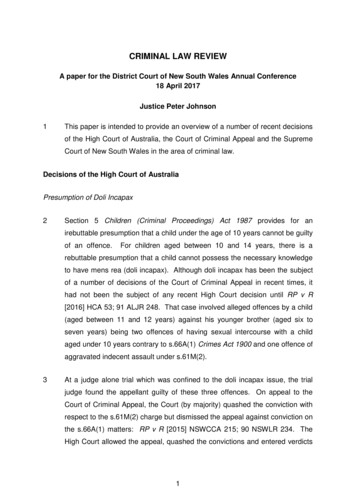
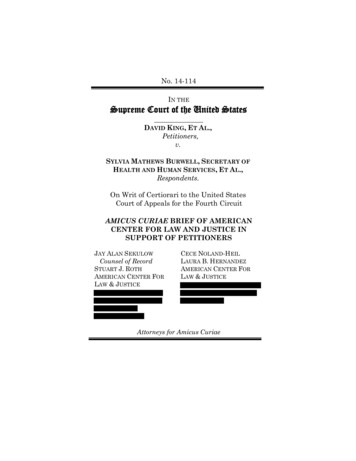
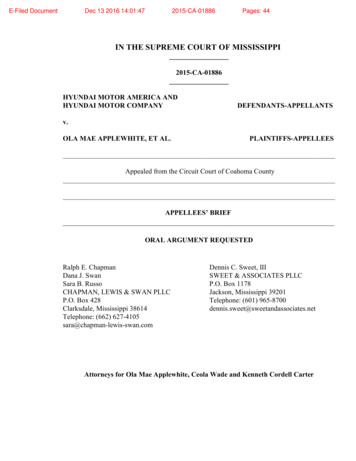
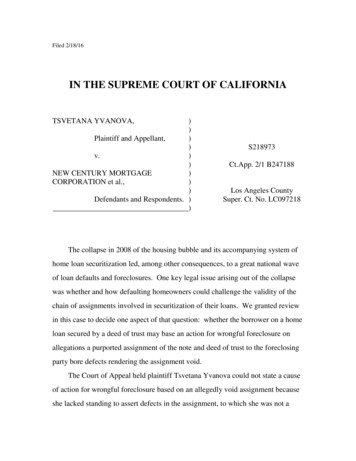
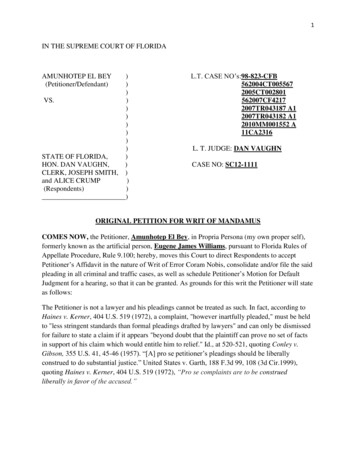
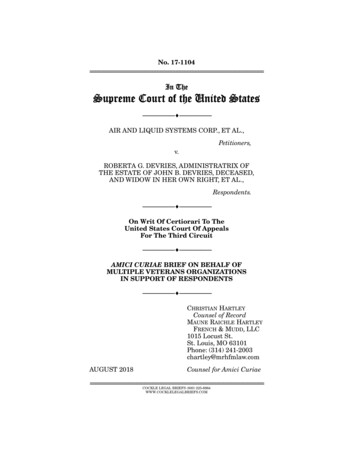
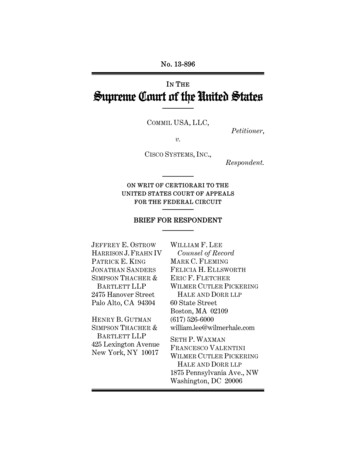
![IN THE SUPREME COURT OF T]-lE STATE OF MONTANA](/img/7/526b198c923f8.jpg)
